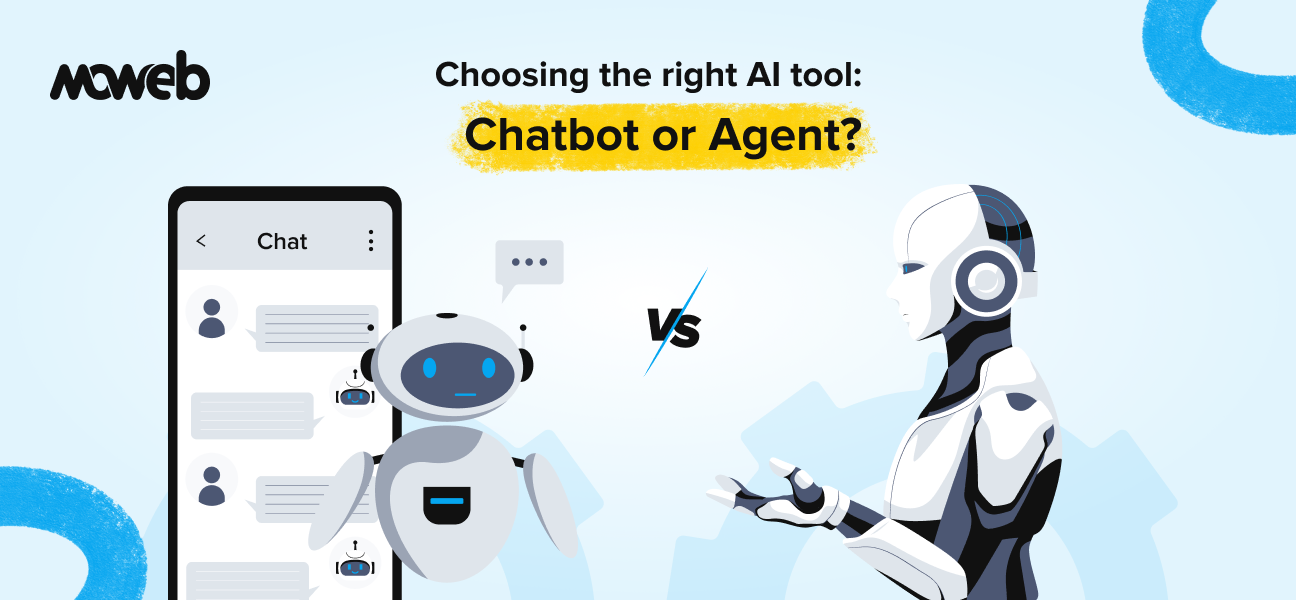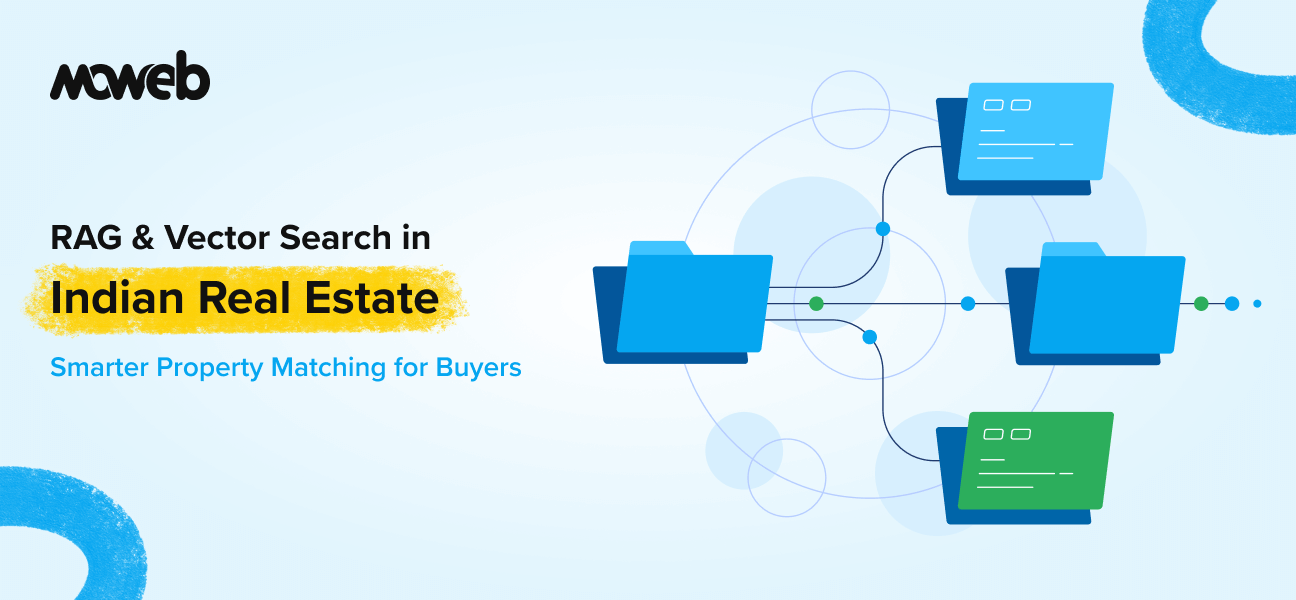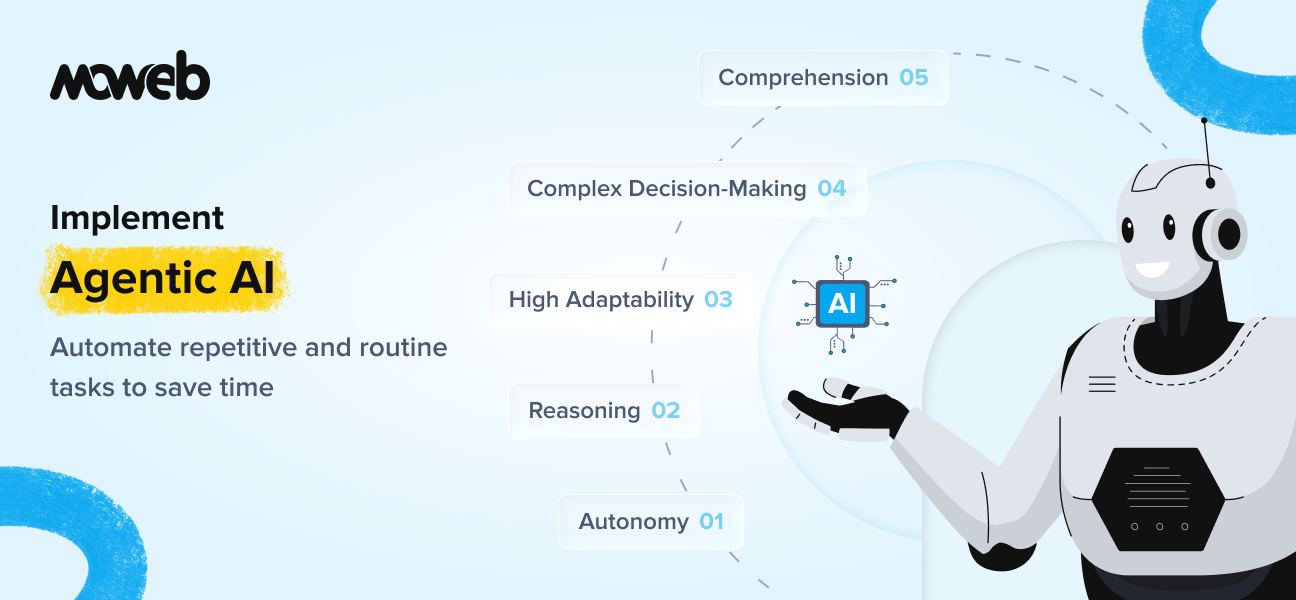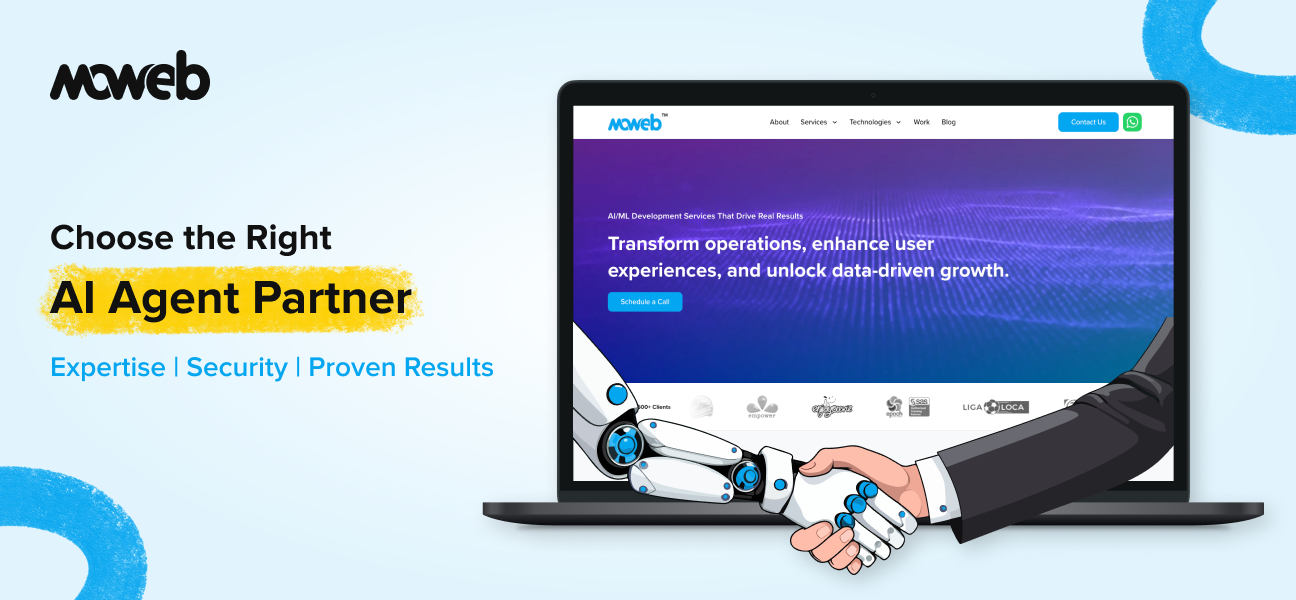
The flash advances in artificial intelligence have significantly changed how businesses approach customer support, automation, and digital transformation. Deciding between AI chatbots vs AI agents is now fundamental to shaping business workflows and customer engagement.
AI Chatbots are conversational tools designed to answer regular queries using scripted workflows and basic natural language processing (NLP). For e.g., Zendesk Answer Bot or a simple website chat widget that handles tasks like tracking orders or frequently asked question responses, making them invaluable as entry-level AI customer service tools.
AI Agents, however, are sophisticated digital workers that use advanced machine learning, contextual awareness, and automation. They recognize the intent, manage complex multi-step processes, adapt with time, and can directly execute actions without human interference. Modern AI agents are reforming business process automation, acting as the intelligent bridge between data, systems & customers.
This guide details AI chatbots vs AI agents, helps identify which tool fits your needs, and explores the broader theme of intelligent AI agent use cases in the future of conversational AI.
Key Differences: AI Chatbots vs. AI Agents
Choosing between AI agents vs AI chatbots comes with an understanding of the technology, abilities, and business impact. The table below outlines these critical differences for business process automation and growth.
| Feature | AI Chatbots | AI Agents | Ideal For |
| Tech Foundation | Rules, scripts, basic NLP | LLMs, advanced ML, deep NLP | Agents |
| Memory | Stateless or session-based | Contextual, long-term memory | Agents |
| Autonomy | Reactive, waits for user prompt | Proactive, takes initiative | Agents |
| Personalization | Minimal, basic if any | High, adapts per user | Agents |
| Task Complexity | Single/linear workflow | Multi-step/multi-system | Agents |
| Integration | Single platform, limited APIs | Cross-platform, deep APIs | Agents |
| Learning/Adaptivity | Static, requires manual updates | Self-improving, learns live | Agents |
| Deployment Speed | Fast, PoC in days | Longer, system-wide setup | Depends |
| Cost | Low-medium | Higher upfront, more ROI | Depends |
| ROI Timeline | Quick via deflection | Medium-long, scalable gains | Depends |
CTA: Boost ROI, streamline service, and future-proof your business with Moweb’s actionable chatbot vs agent insights and assessment tools.


Ready to Unlock AI for Your Business?
Contact us to get a personalized quote and start building your custom AI solution today!
Industry-Specific Use Cases: AI Agents and Chatbots
Every industry finds unique value in deploying AI chatbots vs AI agents for business support:
Banking & Finance
AI Chatbots:
- Handle account balance inquiries and transaction history requests
- Branch locator services, instant & accurate answers, and basic queries from staff
- Automate FAQs about loans, cards, or account setup
- Support 24/7 banking and improve customer access
AI Agents:
- Analyze real-time data transactions for fraud detection
- Actively flag suspicious activity
- Underwrite loans by aggregating and verifying applicant details across banking systems
- Increase speed and precision
- Offer dynamic, personalized investment advice
- Use customer goals, market data & transaction insights to recommend relevant products
Healthcare
AI Chatbots:
- Appointment scheduling assistance
- Basic symptom checking and insurance FAQ responses
- Reduce workload for administrative staff
- Improve patient experience
- Guide patients through pre-visit instructions & routine follow-ups
AI Agents:
- Extract and update electronic medical records (EMR) and verify eligibility
- Flag high-risk patients through ongoing health data monitoring
- Predictive analytics and enables proactive intervention
- Ensure regulatory compliance
- Check documentation and track adherence throughout the care process
E-commerce
AI Chatbots:
- Track orders, handle returns/refunds
- Answer product or shipping FAQs
- Reduce friction in customer journeys
- Upsell and cross-sell by providing product suggestions
AI Agents:
- Forecast demand and optimize inventory
- Analyze sales data, seasonality & supply chain signals
- Manage complex customer requests such as bulk orders, shipping exceptions, or special order backs
- Automate dynamic pricing
- Personalized marketing campaigns to increase conversion and loyalty
IT Support/Security
AI Chatbots:
- Step-by-step troubleshooting for common IT issues
- Reduce ticket volume for IT staff
- Deliver knowledge base articles and software usage tips
AI Agents:
- Orchestrate ticket triage and resolution
- Diagnose root causes, assign issues to the right teams, and monitor status automatically
- Monitor systems for real-time threats
- Respond with automated containment actions
- Escalate serious incidents to security teams.
- Manage user credentials and access requests securely
Manufacturing
AI Chatbots:
- Automate customer and supplier interactions
- Improve communication speed and consistency
- Handle supply management queries
- Support recall procedures via integration with ERP systems
- Reduce errors and increase efficiency
- Facilitate floor operations and report generation
- Free human operators for complex troubleshooting
AI Agents:
- Enable predictive maintenance by analyzing sensor data from production equipment
- Anticipate failures and schedule repairs to minimize downtime
- Streamline quality control using computer vision
- Detect defects in real-time, enhancing product reliability
- Optimize inventory and logistics through AI-powered forecasting, procurement, and delivery management
- Reduce waste and costs
Insurance
AI Chatbots:
- Support clients with instant quotes
- Claims tracking and routine policy inquiries
- Lower response times and enhancing user experience
- Guide users through complex forms and documentation upload
- Reduce barriers to self-service and boost satisfaction
AI Agents:
- Automate the entire claims process,
- Analyze documents, photos, and policy data
- Detect fraud by cross-referencing claims data with historical patterns
- Flag suspicious activity for deeper investigation
- Provide dynamic risk assessments and personalized policy recommendations
- Empower agents and underwriters to deliver more accurate, tailored offerings
Hospitality
AI Chatbots:
- Manage booking inquiries, reservation changes, and room service requests
- Respond to guest FAQs and streamline front-desk duties
- Personalize recommendations based on guest preferences
AI Agents:
- Optimize workforce schedules in real time
- Match occupancy and guest demand
- Coordinate housekeeping, maintenance, and guest services across departments
- Ensure tasks are routed, tracked, and completed proactively
- Analyze guest feedback across channels
- Identify service improvement opportunities
- Automate loyalty program management
- Enable data-driven guest personalization
These intelligent AI agent use cases are expanding rapidly as AI development services make full automation more accessible and secure.
Choosing the Right Tool: Decision Framework
Selecting AI chatbots vs AI agents for your business relies on a systematic decision process.
- Task Complexity: You must use chatbots for easy & repetitive tasks such as order checks & appointment bookings. For processes that need logic, contextual decision-making, or multi-step automation, intelligent AI agent use cases work best.
- Integration Needs: Chatbots suffice in a single-platform setup. AI agents are better for bridging multiple systems, such as CRM, ERP, etc., which is ideal for business process automation.
- Support & Maintenance: Chatbots require less maintenance and technical expertise. AI agents, on the other hand, demand strong infrastructure and pay off with flexibility.
- Strategic Goals: Think of scalability, hyper-personalization, and efficiency. AI agents excel in industry-specific AI scenarios needing deep business integration.
- Budget: Small to medium businesses often thrive starting with chatbots, while AI agents should be considered as complexity and scale grow.
CTA: Not sure if your business needs a chatbot, an intelligent agent, or a hybrid solution?
Explore industry-proven AI development services from Moweb, customized to your goals and budget.
Emerging Trends & The Future of AI Chatbots and Agents
The future of AI chatbots vs AI agents is winding forward with innovations that are empowering businesses to deliver richer, smarter, and more human-like customer experiences.
Hyper Personalization with Generative AI
Modern intelligent AI agents can now analyze vast datasets in real time, dynamically tailor responses, and provide recommendations for each person. This allows businesses to understand needs in advance, personalize advice, and engage users in ways impossible with traditional systems.
Smarter, Context-Aware Business Automation
Equally transformative is the rise of smarter, context-aware business automation. Artificial intelligence chatbots, especially AI agents, can now understand conversation flow, user history, and business context/ They can enable complex process orchestration, proactive assistance, and adaptive decision-making. This momentum is driving industry-specific AI adoption in sectors from healthcare to finance and eCommerce.
Democratization of AI through No-code Platforms
The democratization of AI through no-code platforms levels the playing field for organizations of all kinds. Now, even businesses without development teams can rapidly deploy AI customer service tools and business process automation solutions. Visual builders and drag-and-drop tools are making it easy to create, customize, and scale AI chatbots vs AI agents for diverse requirements.
Human-like interactions with Advanced NLP
Advanced NLP is surging human-like interactions, reducing the gap between automated responses and genuine, empathetic customer service. AI agents now utilize voice, sentiment analysis, and context retention for conversations that feel authentic and emotionally intelligent. This strongly anchors the future of conversational AI and chatbot vs agent insights.
These trends are redefining how AI development services are used to build scalable, adaptive, and transformative business solutions.
Implementation Tips for Success
Getting started with AI chatbots vs AI agents? Here are actionable tips for a seamless rollout:
- Start Small: Launch a focused chatbot for business support as a PoC, measure engagement, train on real data, and refine frequently.
- Monitor Performance: Use analytics to track user flows and escalate ambiguous queries to humans for troubleshooting.
- Invest in Infrastructure: For Artificial intelligence agents, build secure integrations and flexible APIs that allow for later modular upgrades.
- Modular Design: Structure workflows for easy chatbot-to-agent migration as needs evolve.
- Emphasize on Transparency: Make automation clear to users, set human escalation pathways, and ensure AI actions are auditable for trust.
Conclusion
Choosing between AI chatbots vs AI agents comes down to your company’s size, task complexity, integration landscape, and strategic ambitions. For many small to medium businesses, chatbots deliver quick wins in support and efficiency. Larger corporations or those looking to scale with complex, cross-department demands can benefit the maximum from AI agents and intelligent automation backed by robust AI development services.
No matter where you start from, you will benefit significantly by evaluating your unique needs, piloting solutions, and scaling intelligently. Still unsure? Audit your business with our in-depth Artificial Intelligence tool assessment guide, move towards seamless automation and sustained growth with confidence.
FAQs
Can an AI chatbot replace human customer service entirely?
AI chatbots are excellent for automating routine interactions and answering frequently asked questions, enhancing efficiency in AI customer service tools. However, they cannot fully replace humans due to limitations in understanding complex emotions, requests & unpredictable scenarios. You can combine chatbots with human agents for the best balance of automation and empathy in customer support.
What is the biggest difference between AI chatbots and AI agents?
The key distinction lies in capability. Artificial intelligence chatbots follow scripted flows or NLP for handling simple, linear tasks, while AI agents use advanced machine learning, contextual understanding, and integration to automate complex workflows. This fundamental difference decides their roles in business process automation and intelligent AI agent use cases.
Can small businesses benefit from AI agents, or are chatbots sufficient?
For many small businesses, chatbots for business support provide immediate value by automating common queries at a low cost. However, as your business grows or requires industry-specific AI solutions with customized workflows, intelligent AI agents become essential for scalability, personalization, and efficiency. Choosing the right AI tool depends on task complexity and integration needs.
How do AI agents improve personalization over chatbots?
AI agents use long-term memory, behavioral data, and real-time contextual analysis to create hyper-personalized user experiences beyond the capabilities of traditional chatbots. This enables tailored recommendations, predictive insights, and adaptive dialogue suited to individual customer journeys. This is pushing the future of conversational AI forward with more meaningful business interactions.
Are AI agents harder to integrate into existing systems than chatbots?
Yes, Artificial intelligence agents require deeper integration across multiple platforms and data sources compared to the single-system deployment of chatbots. Although this increases initial complexity and setup time, the resulting business process automation and cross system orchestration provide higher ROI and long term scalability.
What industries will see the fastest adoption of AI agents?
Industries with complex workflows and regulatory demands, including banking and finance, healthcare, IT security, and eCommerce, are leading the adoption of AI agents. These sectors benefit from intelligent AI agent use cases that support fraud detection, patient monitoring, cybersecurity orchestration, and supply chain management, driving measurable business impact.
Can I start with a chatbot and upgrade to an agent later?
Absolutely, adopting a chatbot first for straightforward business support creates a low-risk entry point into AI. Subsequently, scalable platforms and modular designs allow seamless upgrades to intelligent AI agents that handle complex workflows and multi-platform automation. This progressive approach enables a cost-effective transition aligned with growing business process automation needs.
How do I know whether my business needs a chatbot or an agent?
Evaluate your workflows based on complexity, integration breadth, and personalization requirements. Simple, repetitive tasks are well suited to chatbots, while multifaceted processes demanding cross-system coordination and dynamic decision-making require Artificial intelligence agents. Consulting expert AI development services can help tailor a solution that fits your industry-specific AI vision and operational goals.
Found this post insightful? Don’t forget to share it with your network!





